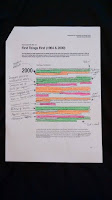*Interview starts by me showing Dr Revill the first 13 minutes and 30 seconds of The Simpsons, Series 2, Episode 13: Homer vs Lisa and the 8th Commandment.
Q: How long have you been a Doctor?
A: 53 Years.
Q: And how long have you been a protestant preacher?
A: A bit longer, 59 years.
Q: If you were Reverend Lovejoy having the conversation with Lisa Simpson, what would your advice to her have been?
A: Certainly is not to watch the forbidden fruit as it were, but then to tell her farther that he ought not to be involved as he may get into trouble with the law.
Q: Is this not going against the fifth commandment?
A: Not really, no. She’s still respecting her father, and he ought to set an example as a father not to encourage his family to use methods of stealing which were dubious.
Q: So does this mean that, on occasion, there are situations where any rule, even one of the ten commandments, will find an exception?
A: Yes. The ten commandments have to be taken together as a whole and sometimes one of them is much more relevant than the others, meaning that sometimes you can not obey one of the commandments without breaking one of the others. We call this situational ethics, so stealing a loaf of bread for someone who’s starving isn’t necessarily wrong.
Q: You said something to me the other day about the war with Isis, and how you don’t believe in war, but you believe in peace, and you believe in defending innocent people. In defending innocent people in this instance, to some extent there’s a case of accepting war. Does this mean that you don’t think moral rules should have some wiggle room in them?
A: Yes, this is situational ethics.















